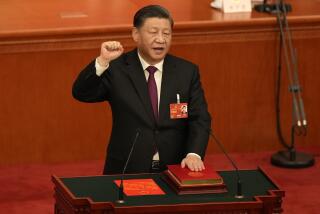As Their Rulers Huddle, Chinese Are Left Out in the Cold
BEIJING — Communist Party congresses were sometimes so secret in years past that the Chinese public received no news of them until they were over.
This week, there’s no mistaking that China’s ruling party is holding its 16th National Congress here. Red banners flutter from buildings, newspapers sport headlines in red ink, and cab drivers see red because of extra-long traffic jams.
But news of the congress remains nearly as scarce as ever. Despite saturation coverage by the media, the government’s propaganda czars have been busy ensuring that reports out of the congress are cleansed of real news value.
Instead, as the 2,114 delegates meet behind closed doors to debate policy and personnel issues that will affect this nation of 1.3 billion people, the media have turned the occasion into a love fest for the party and President Jiang Zemin.
“Let us sing enthusiastic songs about our achievements,” exhorted the headline of a typical editorial in the People’s Daily, the party mouthpiece.
Newspaper articles boast that economic output has quadrupled since market reforms began in 1978. Other stories focus on smiling people whose lives have improved under the party’s tender care.
There is no hint of perhaps the most crucial item on the agenda: the transfer of power from Jiang and other senior leaders to a new generation of officials. Hardly anything has been said about Jiang’s expected successor, Vice President Hu Jintao.
Challenges facing the Communist regime are barely acknowledged, such as the fact that millions of Chinese would answer “No” to the question posed by another People’s Daily editorial: “Are you aware that you’re living in prosperity?”
The lack of any real political discourse in the mass media indicates how China’s political system remains mired in its Leninist past, observers say, even as the economy marches headlong into modern capitalism.
For all the new economic and social freedoms enjoyed these days by ordinary Chinese -- who work, live and marry as they please -- the Communist regime maintains an iron grip on political power and hews to its old unaccountable ways. None of the key decisions at this week’s congress, from policy to personnel, is open to popular scrutiny, opinion or approval.
“I know this is quite different from elections in Western countries, where you know who the candidates are and what kind of policies they’re going to enforce. Here, it’s not so transparent,” said teacher Mo Shu, who did find a silver lining: “Sometimes that makes it more interesting. Everybody likes surprises.”
Almost all the news dispatches during the conclave have been generated and vetted centrally, then handed out to media organizations to use.
The practice seems outmoded, because many, if not most, Chinese are savvy enough not to be taken in anymore by the homogenized coverage.
“It’s in all the newspapers and TV programs -- you just can’t get away from it,” said an exasperated Li Xin, a Beijinger who works for a foreign trading company. “But there’s nothing really worth reading or watching. It’s all the same -- all good things.”
“I don’t care what they’re propagandizing about,” said Mo, the teacher. “I care about what they’re going to do with China’s severest problems, such as corruption, unemployment and economic development.”
Any political discourse tends to be couched in the Communist-speak of decades past. The People’s Daily described the congress’ agenda as “holding high the great banner of ‘Deng Xiaoping Theory,’ completely implementing the important thought of the ‘Three Represents’ ” and summarizing the party’s “great practice of uniting and leading all of the nation’s peoples in constructing socialism with Chinese characteristics.”
Headlines praise Jiang’s “Three Represents” theory, a hazy philosophy to allow entrepreneurs into the party, as “the crystallization of the entire party’s wisdom” and “a magnificent blueprint” for society.
Such lofty rhetoric fails to strike a chord with many urban Chinese and only deepens the alienation many feel from the party, they say. The congress, many say, feels irrelevant to their lives.
“It doesn’t have much to do with me, or with any of the common people,” Li said.
More to Read
Sign up for Essential California
The most important California stories and recommendations in your inbox every morning.
You may occasionally receive promotional content from the Los Angeles Times.











